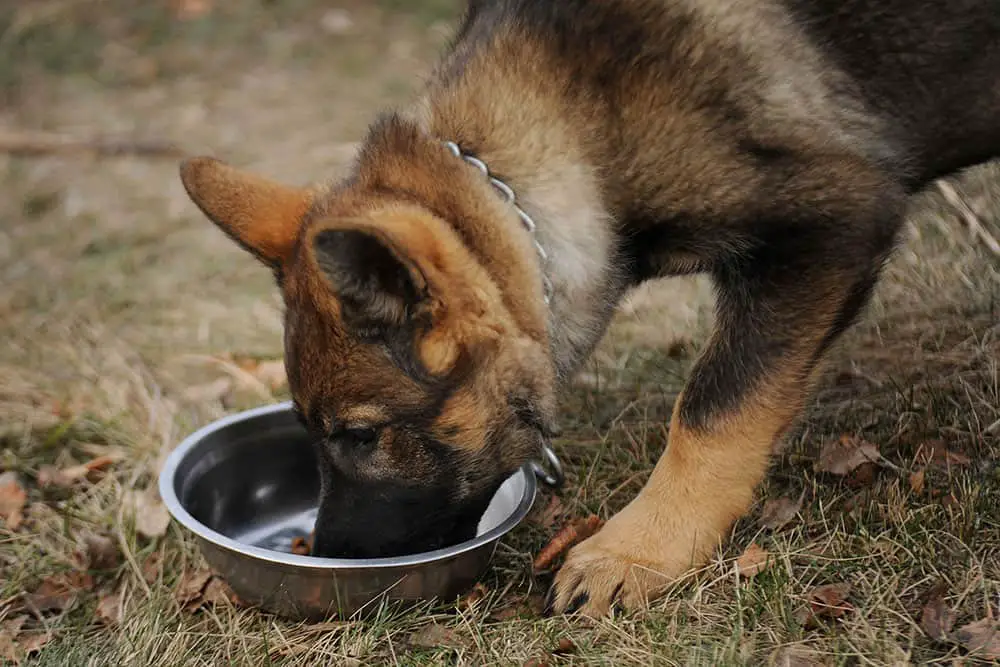German Shepherds are a loyal, confident, and energetic breed of dog. However, German Shepherd puppies need proper care, attention, and nutrition as they undergo growth in their initial year of life.
If you neglect giving your German Shepherd puppy the right nutrition, they will be more susceptible to a variety of health complications and will become nutritionally deficient.
In this article, I will cover the 7 best foods for your German Shepherd puppy to ensure that they grow into adulthood in the healthiest way possible.
Keep reading to find out more.
OUR TOP PICK
EDITORS CHOICE
BEST VALUE
OUR TOP PICK
This Hill's Science Diet Dry Dog Food is a large breed of puppy food specially made with an optimal level of calcium for controlled bone growth.
This dog food is made with natural ingredients and uses DHA from fish oil to support your large dog's eye development and brain function.
Hill’s uses only high-quality ingredients including real chicken, lamb or salmon protein.
Pros
- #1 Veterinarian recommended - Rest assured that more than 220 veterinarians, food scientists, technicians and Ph.D. nutritionists at Hill's develop all of Hill's pet foods to meet the needs of your pets.
- High quality protein - Hill’s dry pet foods have quality protein as the first ingredient and provide clinically proven antioxidant benefits.
- Natural ingredients - This puppy food never contains artificial colors, flavors, preservatives or chicken by-product meal.
Cons
- One customer claimed that this food was pricier than other brands of puppy food that they had bought in the past.
EDITORS CHOICE
Eukanuba Puppy Large Breed Dry Dog Food provides complete and balanced nutrition for large breed puppies up to 15 months.
This puppy food supports healthy brain development with clinically proven levels of DHA for smarter, more trainable puppies.
This complete and balanced puppy food is made to fuel your growing companion’s body, mind, and energy.
Pros
- High-quality ingredients - High-quality chicken is the first ingredient for protein that powers your puppy’s day.
- Easily digestible - A natural fiber and prebiotic blend aids gentle digestion.
- Promotes healthy immune system - Guaranteed levels of the antioxidant vitamin E help support your little champion’s developing immune system.
Cons
- One customer noted that this puppy food took longer than they were expecting to arrive in the mail.
BEST VALUE
The Royal Canin German Shepherd Puppy Breed Specific Dry Dog Food is designed to meet the nutritional needs of purebred German Shepherds 8 weeks to 15 months old.
This puppy food features an exclusive mix of antioxidants and vitamin E supports their developing immune system and keeps their body growing strong.
Formulated with high-quality protein and prebiotics to support digestive health and a balanced intestinal flora, which promotes optimal stool quality.
Pros
- Exclusive kibble shape - This kibble is designed specifically for a German Shepherd’s long, strong muzzle to encourage chewing.
- Highly digestible - This puppy food is made of highly digestible proteins and specific fibers that maintain digestive health and improve stool quality.
- Immune system support - Helping to support your puppy's natural defenses with a blend of antioxidants including vitamin, this food is designed to support your puppy’s immune system.
Cons
- One customer claimed that this particular German Shepherd arrived and had been cut open.
RUNNER UP
The Blue Buffalo Wilderness High Protein, Natural Puppy Large Breed Dry Dog Food is made with the ingredients to help promote healthy development.
This food features a precise blend of antioxidants, vitamins and minerals that are carefully selected by holistic veterinarians and animal nutritionists to support immune system health.
This puppy food is made with ingredients to help promote healthy development including DHA and ARA, important fatty acids found in mother's milk, to help support cognitive development and retinal health.
Pros
- Quality protein - This high protein puppy dog food features real chicken to help encourage strong muscle growth
- Natural ingredients - This dry dog food is made with the finest natural ingredients enhanced with vitamins and minerals.
- No artificial additives - Containing no chicken (or poultry) by-product meals, corn, wheat, soy, artificial flavors or preservatives
Cons
- A couple of customers noted that this particular puppy food can be messy due to fine crumbs in the bag.
RUNNER UP
The Blue Buffalo Wilderness High Protein, Natural Puppy Wet Dog Food is protein-rich and made with the finest ingredients for your dog’s development.
This dog food contains no chicken (or poultry) by-product meals, corn, wheat or soy.
Blue Buffalo also never adds any artificial flavors or preservatives that are known to upset your dog’s stomach.
Pros
- Natural ingredients - All Blue canned dog foods are made with the finest natural ingredients enhanced with vitamins and minerals.
- Versatile - This wet dog food adds interest mixed into your dog’s favorite dry foods or can be fed as a nutritionally balanced meal on its own.
- Protein rich - The meats used in this dog food include beef, chicken, duck or salmon in a savory gravy.
Cons
- A few customers claimed that they didn’t like the smell of this particular wet puppy food.
RUNNER UP
The Wellness Complete Health Natural Wet Canned Dog Food Puppy Chicken & Salmon is made with natural sources of lean protein and omega rich fatty acids for a balanced diet.
This wet dog food contains premium, nutrient rich ingredients that support strong immune systems, optimal energy, digestive health and healthy skin and coat.
Created by nutritionists, veterinarians and animal lovers, Wellness dog food is designed to provide an ideal balance of nature's finest ingredients, carefully selected to nourish and sustain your pet's wellbeing.
Pros
- High quality - The quality protein and antioxidant rich veggies are expertly balanced to deliver a complete diet packed with the nutrients your dog needs to thrive.
- Omega-3 fatty acids - This dog food is rich in fiber and Omega 3 fatty acids, flaxseed is an important ingredient to help support healthy digestion and a shiny coat.
- Highly digestible - This canned food contains no meat byproducts, fillers, or artificial preservatives, so you’re not feeding your puppy any hidden nasties.
Cons
- One customer noted that their puppy became fussier when presented with this wet dog food.
RUNNER UP
The Royal Canin Size Health Nutrition Large Breed Chunks in Gravy Pouch Dog Food is specifically formulated for puppies up to 15 months old.
This dog food is designed to support a puppy’s natural defenses and developing immune system with a complex of antioxidants, including Vitamin E.
Containing highly digestible proteins that promote digestive health, this food also supports optimal stool quality.
Pros
- Highly digestible - This dog food aids healthy digestion and supports a balanced intestinal flora.
- Convenient feeding - Royal Canin Large Puppy wet dog food are pre-portioned in pouches to make it easier than ever to feed your large breed puppy wet food.
- Hydration - The moisture content of this wet dog food can help support hydration in your puppy as they’re developing.
Cons
- A few customers claimed that this wet dog food worked better on top of dry kibble.
Best Foods For German Shepherd Puppies (Wet And Dry) Buying Guide
There are a few things to keep in mind when purchasing food for your German Shepherd puppy, but it primarily comes down to health issues, protein, and whether you opt for dry or wet dog food.

You will also want to make sure that you’re opting for good quality dog food with excellent natural ingredients.
Lower quality dog foods can be packed full of fillers that have little to no nutritional value as well as meat byproducts, and artificial preservatives amongst other hidden nasty ingredients.
These ingredients can leave your German Shepherd puppy with a nutritional deficiency and a variety of other health issues, particular stomach sensitivities.
Read the following factors below before going ahead with your purchase.
Health Issues
The most important factor to take into account when choosing a dog food for your German Shepherd is health issues.
Like a variety of dog breeds, German Shepherd puppies can be prone to having sensitive stomachs and can be allergic to certain ingredients.
Bearing this in mind, you will need to spread out their meals throughout the day in small intervals and take extra care with what you feed them to avoid any stomach upset or sensitivities.
Being patient with your puppy is absolutely key here, as you will need to allow them time to adjust to their new diet.
Some health conditions that affect German Shepherds are:
- Sensitive stomachs
- Hip dysplasia
- Protein and corn allergies
- Skin allergies
As German Shepherds are susceptible to joint problems, malnutrition as they are growing as a puppy can lead to elbow or hip dysplasia in adult dogs.
As a result, making sure they are fed a healthy, balanced diet is absolutely essential.
In addition to this, German Shepherds can suffer with sensitive stomachs that are often made worse by specific allergies.
For instance, some German Shepherds can be allergic to grains such as corn and wheat.
In addition to this, German Shepherds can also be allergic to certain proteins such as chicken, beef, and pork.
This can lead to an array of symptoms, such as vomiting, diarrhea, and loose stools. You will need to keep an eye out for these signs when switching up their diet.
German Shepherds can also be prone to skin allergies. Signs of these allergies include biting on parts of the German Shepherd’s body, chewing or scratching.
You will need to keep these health conditions in mind when you pick out their food. However, finding out your dog’s allergies comes down to trial and error a lot of the time.
Isolating the cause of the allergen responsible for your dog’s systems is commonly achieved through an elimination diet.
However, there’s no need for you to actively avoid ingredients unless your dog has had a reaction to it or your veterinarian has advised you to do so.
It’s also important that you do your research. If you’re not adopting a German Shepherd puppy, and instead are buying one, it’s important that you know it’s from a reputable breeder.
Don’t be afraid to ask questions to verify whether the breeder you are interested in is reputable. A good breeder will be happy to show you their breeding dogs and health records and won’t mind you asking questions.
A reputable breeder will be honest about the health issues German Shepherds can be prone to.
If they seem reluctant to show you the health records of the dogs that they breed or don’t want to answer your questions, then this is generally a huge red flag.
Protein
A hugely important factor to consider when purchasing dog food for your German Shepherd puppy is the protein content.
German Shepherd puppies are extremely active dogs, and you’ll want to make sure that you’re providing them with the right balance of nutrition to aid their active lifestyle.
Protein requirements for growing puppies are the highest immediately after weaning, but the amount of protein they need will begin to steadily decrease.
Typically speaking, the recommended protein range for healthy puppy growth is 22-32%. This applies to German Shepherds, as they need a minimum of 22%.
These levels support optimal growth, so it is generally not recommended to exceed these protein levels unless your veterinarian advises you to do so.
Feeding Schedule
You will also need to bear in mind a feeding schedule when choosing puppy food for your German Shepherd. From 8 to 12 weeks, a German Shepherd puppy should be fed 4 times a day, spread out over equal intervals.
From 12 weeks to 6 months old, you can reduce this to 3 times a day. From 6 months to 1 year, the number of times that you feed them can be reduced again to 2 times a day.
When coming up with a feeding schedule, it’s important that you consult with your veterinarian to seek their advice on the matter.
Underfeeding or overfeeding your dog has serious consequences.
Bearing this in mind, as your pet grows, you need to weigh and feed them accordingly to ensure that you’re keeping them at a healthy, happy weight.
Regular veterinarian check-ups will also help you to determine this.
German Shepherd puppies will typically eat more than adult German Shepherds because they need more calories and nutrients in order to grow.
That being said, this also depends on the temperament of your dog.
While the majority of German Shepherds are active, their activity levels can vary from dog to dog. If your German Shepherd is more relaxed, it will consume less food than a working police dog that exercises all day.
This simply comes down to the fact that working dogs exert more energy and therefore require more food with high protein content to provide them with the energy for their activities.
It is also essential to note that because German Shepherds are prone to having sensitive stomachs, consistency in their diet and feeding schedule is crucial.
You should never drastically alter your dog’s diet, as this can lead to a variety of health issues.
For instance, if your puppy is used to eating 4 times a day, you wouldn’t then change this to twice a day at the drop of the hat. Reducing the number of times you feed your dog in a day needs to be done gradually.
In addition to the number of times you feed your dog, when it comes to altering the type of food that you feed your German Shepherd puppy, it is necessary to their health that you do this slowly.
Not only will this allow your dog the chance to adapt to their new food, but it will also give you the opportunity to notice if anything seems out of the ordinary, such as a food or skin allergy as a result of the food that you’ve bought.
Wet Or Dry Dog Food
Another factor that you will need to consider is whether you feed your German Shepherd wet or dry food or a combination of both.
What type of dog food you feed your German Shepherd puppy will come down to their preferences and what works for you best. There are both positives and negatives of feeding your German Shepherd wet dog food.
The main benefit of wet dog food is that it provides more hydration, as it is made up of around 70 to 75% water.
On the other hand, as dry kibble only provides around 20% hydration, this extra water that wet food provides is a good way of making sure that your German Shepherd puppy is getting enough fluids throughout the day.
That being said, wet foods tend to be more expensive and contain fewer nutrients because of the high moisture or water content.
As a result, your German Shepherd needs to eat more wet food than dry food to achieve the same amount of proteins, fat, and nutrients that their body needs to stay active.
Alternatively, dry kibble only has a water content of around 20% water.
However, despite the lack of hydration this dog food provides, dry kibble plays an essential role in keeping plaque and tartar at bay and are fundamental for your dog’s dental health.
Dry kibble is excellent for scraping any plaque build-up in the process of your dog chewing crunchy dry kibble.
Dry dog food can be served as it is, or alternatively, you can try adding water to make a gravy that can make it more appetizing for your dog.
This, in turn, also provides the dry kibble with a boost of hydration that it is normally lacking when served dry.
However, you need to check the manufacturer's recommendations or instructions to get the measures of water right. After all, you don’t want to make it too soggy for your dog or risk them turning their nose up at it!
If you want your dog to enjoy the best of both worlds, you could always try giving your German Shepherd puppy a mixture of both dry kibble and wet dog food.
This is a great option if your puppy seems fussier when presented with only dry kibble, as wet dog food has a meaty aroma that is sure to tempt them to the bowl.
However, it’s important that if you are going to feed your German Shepherd a mixture of dry and wet dog foods, that you speak with your veterinarian.
By seeking your nutritionist or veterinarian's advice, you will ensure that you are feeding your German Shepherd within their calorie limits.
The last thing you want is to exceed your dog’s recommended calorie intake, as this can lead to a variety of health issues, including obesity.
Consult Your Veterinarian
German Shepherd puppies can have sensitive stomachs.
Digestive problems can range from mild diarrhea caused by a sensitivity to a particular food to more serious and life-threatening conditions such as bloat, pancreatitis, or IBD.
As a result, it is your responsibility to check with your pup’s vet before you make any drastic changes to their diet.
Your vet will be able to tell you which food your German Shepherd puppy should be eating for any health conditions that they might develop as they grow.
In addition, if your dog has any allergies or seems to be sensitive to certain foods, your vet will be able to advise you on how to manage this.
If in doubt about your German Shepherd’s diet, make sure that you check in with your veterinarian.
Frequently Asked Questions
How Often Should A German Shepherd Puppy Eat?
Your veterinarian will be able to help you come up with a feeding schedule for your German Shepherd puppy that works for you both.
However, typically speaking, a German Shepherd puppy should be fed multiple times in a day, spread out over equal intervals.
You can use this as a rough guide and alter accordingly:
- From 8 to 12 weeks, a German Shepherd puppy should be fed 4 times a day.
- From 12 weeks to 6 months old, you can reduce the number of times that you feed them to 3 times a day.
- From 6 months to 1 year, you reduce the number of times you feed them again to 2 times a day.
It’s important to mention that every dog is different, and you might find that you need to alter this schedule in accordance with your pet’s needs.
This is why it’s important to visit your vet and speak with them before making any drastic changes to your German Shepherd’s diet.
Do German Shepherds Have Sensitive Stomachs?
Yes, German Shepherds are known to have sensitive stomachs and can be allergic to certain foods, too.
You will want to make sure that you look out for any signs of allergies when feeding your German Shepherd grains such as corn and wheat.
In addition to this, you will also want to be wary of certain proteins that could cause a reaction, such as chicken and beef.




